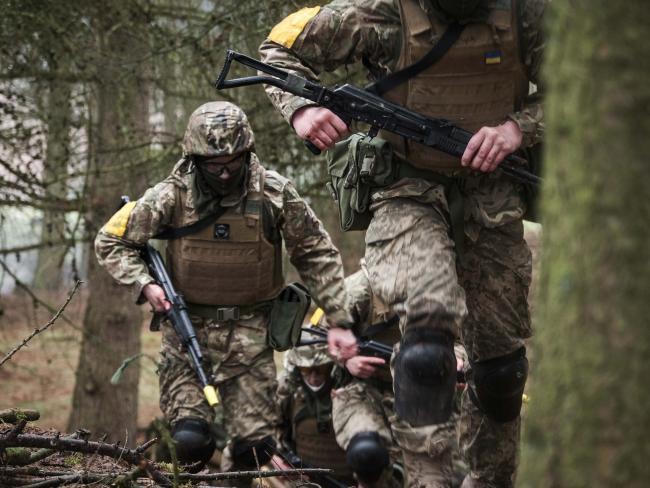2 October 2023

Ukrainian soldiers training in Britain in March 2023 as part of an exercise conducted by British and other allied forces. Photo NATO North Atlantic Treaty Organization via Flickr (CC BY-NC-ND 2.0).
The British government has threatened to escalate Britain’s involvement in the war in Ukraine. This drive to war is not in the interests of British workers.
The new defence secretary Grant Shapps gave an interview to the Sunday Telegraph on 1 October, outlining plans to deploy British armed forces in Ukraine. The prime minister Rishi Sunak quickly qualified this to say there were “no immediate plans” to do so, but confirmed ongoing involvement.
Ramp up
The government wants Britain to ramp up its training programme for Ukrainian soldiers. British and allied armed forces have already trained over 20,000 recruits from the Armed Forces of Ukraine here in Britain since the start of 2022.
Now the government wants more of this training to be carried out in Ukraine itself. That increases the risk of British soldiers becoming drawn into direct combat with Russia. This would be on top of the 50 British special forces reportedly operating secretly in Ukraine since earlier this year.
Arms factories
The government wants more military equipment to be produced in Ukraine. Shapps called on more British arms firms to set up factories there, following the example of British arms company BAE. Again, this escalation would increase the risks of direct British involvement in the war.
Shapps also revealed that he has talked to the Ukrainian president about how the Royal Navy could defend grain ships from Russian attacks in the Black Sea. Putting Royal Navy warships in the Black Sea, with orders to defend shipping from Russian attacks, carries a high risk of open confrontation.
Policing
In August, Britain’s air force completed Op Azotize – four months leading the NATO air policing operation in Estonia, one of the five NATO members directly bordering Russia. Another is Finland, which became a NATO member in April, and rapidly joined in with NATO’s Baltic air operation.
The RAF has continued joint exercises with Finland’s air force. These have been described as reviving Cold War tactics. The British government and military were already committed to these aggressive actions even before Shapps took office.
Pledge
Shapps further suggested that Britain should endorse the pledge of former prime minister Liz Truss to increase military spending to 3 per cent of GDP. He said that the current target of 2.5 per cent was just a “staging post”. He revealed that the government was helping Ukraine “shape up” to join NATO.
He said it would be “pretty much irresponsible” not to reconsider plans for HS2 in light of the costs of the war in Ukraine. This puts Ukraine’s supposed needs above Britain’s real needs. The cost of supporting Ukraine will increase unless Britain pulls back – and that won’t just affect HS2.
‘Zelensky is looking to commit NATO to the conflict long term.’
These new proposals, even if not implemented in full or immediately, considerably increase our involvement in the war. Volodymyr Zelensky, the Ukraine president, is looking for ways to commit the US and NATO to long term support and intervention in the conflict. Shapps and Sunak are walking right with him on that path.
The more overt approach of publicly discussing stepping up military involvement in Ukraine shows the government’s deepening commitment to fighting this war. And in doing so it hopes to get British workers to support the war too.
No debate
There has been no effective debate in the UK parliament, where support for intervention in Ukraine is assumed. The most recent debate in the House of Lords for example merely discussed the issue in general and called for escalating commitment.
In 2003 the Labour government led by Tony Blair committed British troops to the invasion of Iraq despite widespread public opposition. The Chilcot Inquiry reporting 13 years later concluded that the war was conducted on a faulty legal basis and was unnecessary.
In 2013 the coalition government lost a vote in the House of Commons about taking part in military action against the Syrian government. While Britain continued to be involved with US-led intervention in the Syrian civil war, that was a significant blow to warmongers seeking to raise the level of conflict.
‘There is every reason to question British military adventurism.’
In 2023 there is every reason to question the basis for the British government’s military adventurism and to ask what purpose would be served by putting British armed forces in the firing line. They would not be defending Britain.
We must oppose this government’s drive to lead NATO forces into ever more reckless escalation. We need to demand that Britain leaves NATO, the aggressive alliance that provoked the whole war.
